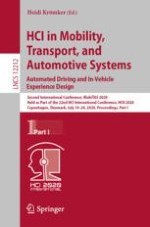2020 | OriginalPaper | Buchkapitel
Fluid Interface Concept for Automated Driving
verfasst von : Paolo Pretto, Peter Mörtl, Norah Neuhuber
Erschienen in: HCI in Mobility, Transport, and Automotive Systems. Automated Driving and In-Vehicle Experience Design
Aktivieren Sie unsere intelligente Suche, um passende Fachinhalte oder Patente zu finden.
Wählen Sie Textabschnitte aus um mit Künstlicher Intelligenz passenden Patente zu finden. powered by
Markieren Sie Textabschnitte, um KI-gestützt weitere passende Inhalte zu finden. powered by
